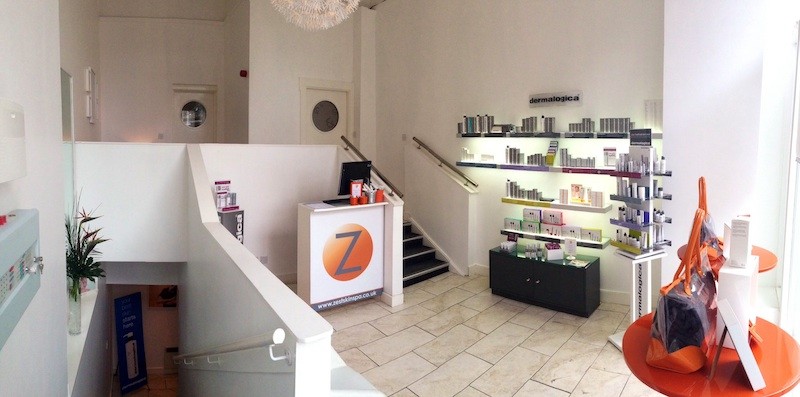The concept behind the monthly “Coffee For Lunch” Phorest interview series is quite simple. Always on the run and tied to a million commitments, we often forget to take a little breather. This month, we’re happy to introduce you spa owner and mother, Louise Caithness, with whom we discuss the almost taboo topic of balancing work-life and parenthood.
More than a mere profile spotlight, this interview series focuses on industry thought leaders’ main areas of expertise or knowlegde and aims to give you a quick insight into their recent projects or ideas.

Coffee For Lunch With Zest Skin Spa’s Spa Founder and Director, Louise Caithness
In the industry for more than 20 years, spa founder and director Louise Caithness knows well about the different challenges that can arise when opening up a business. But what many are afraid to discuss is what happens to the work-life dynamic when you start having children? How do you balance work and parenthood? In this interview, Louise Caithness, Spa Owner and mother of a pre-teen daughter shares her opinion on the matter!
N.B.: This is a lightened transcript of the interview with Louise Caithness.
Related | The Working Parent Blues, Or How To Work From Home With A Child
Let’s Talk About Balancing Work-Life & Parenthood
Phorest Salon Software | First off, how many kids do you have?
Louise Caithness | I’ve got one daughter, who will be nine in June – her name is Skye. […] I’ve had my business for 12 years. This is our 13th year of business, so yeah, the business came first and then along came Skye. She’s a force to be reckoned with, I would say.
–
P.S.S. | That’s interesting that your salon came first. You were two or three years into your business when all of a sudden you realised you were going to have Skye. How was that period? I’m sure, starting off a business, it takes 24/7, but so does new parenting – from my experience anyways.
L. Caithness | Absolutely. I guess it was all planned, to a certain extent. I had my business, and I knew at some stage I wanted to be a mom. When you first set up in business, there’s the old jewel of ‘the first year you’ll never make a profit, the second year you’ll break even, third year’s profit.’ Therefore, it’s really easy after that. I think, naively, I fell into that mindset.
Around year three the business would be settled – or so I thought – and it would be a great time. The business would allow me to take a step back. I knew I was having a baby that particular year, but that same year, two of my staff announced that they were pregnant as well. Of course, that’s not something that your employees discuss with you – that they’re planning on having a child around about that sort of time – so I guess you can’t ever really plan for it. You don’t know what chain of events are going to happen. For me, while I thought I had a team capable of taking the reins so that I could take some time off being a new mom, of course, was never going to happen.
–
P.S.S. | Then I suppose you had to find people to replace them for a limited period?
L. Caithness | Yeah. And what comes with recruitment is training. I found myself in the business just days before Skye was born still carrying out treatments because I was a full-time therapist up until that time. So, yes, juggling a huge amount. She was born on a Thursday, and on Friday, I was back on the phone to the business again. We had an issue with one of our pieces of equipment, and it just had to be dealt with. There wasn’t such a thing as maternity leave. It was a case of: ‘Right, I had my baby. I’m alright. She’s okay. Business as usual. We have to just carry on.’

P.S.S. | So you had no moment for maternity leave whatsoever?
L. Caithness | None at all. Looking back, that was because there was a real lack of systems in place to allow that to happen. It was very difficult. I had no option but just to come straight back to work, and she would come with me in her little carry seat. Clients were really accommodating. They were just, “Fine; I want to get my treatment done. Just bring the baby with you,” so that’s what I did. I’ll be honest, if I think back to those first few months, I’m not quite sure how I did it.
–
P.S.S. | Did you have a maternity leave plan in your salon beforehand – not just for yourself, but for other people?
L. Caithness | Yes. In terms of staff, we did have one. From a legal point of view, we have to provide maternity leave for all of our employees. And because of the nature of our business – all of our employees are female – it’s certainly a policy that we need to have in place because a high percentage of staff members are likely to go through maternity at some stage. Staff retention, in this industry, is very, very difficult, so you have to look after your staff and make arrangements to accommodate them and their family life so that they can come back to work.
I think that’s the beauty of this industry; that we can offer that sort of flexibility. We can be open seven days a week, late at night, and we can offer shifts to moms so that they can work around their family and children obligations.
–
P.S.S. | In regards to your maternity plan, is it that you have somebody replacing the person for a year?
L. Caithness | We look to bring in a replacement. Because we deliver training as well, we’re lucky to have often quite a lot of apprentices or students desperately keen to get work experience alongside their studies. We can them bring in to fill these gaps, gaining valuable work experience without a long-term commitment and working alongside our more experienced therapists.
–
P.S.S. | When, if ever, did you find a balance between taking care of Skye and taking care of your business?
L. Caithness | I think that it took me a little while to find my feet because not long after Skye was born, I found myself being a single parent. After about two years, that’s when it really hit me; I needed to make some changes within the business. It wasn’t performing the way I wanted it to, and I myself, as a therapist/business owner and as a mom wasn’t either. I was saying ‘yes’ to far too many people. That has been a huge lesson. Only up until quite recently I’ve been able to manage myself and be able to say no to people or create boundaries.
I would say Skye was probably about three years old when I made the decision to take on a business manager, somebody that could take the reins of all of the administration and financial side of the business. I needed to be in treatments as I had a clientele of my own and it was a part of the business I could do with my eyes shut, really. And obviously, I needed to be there for my child. So yes, I took on a business manager and on day one, handed to her passcodes and chequebooks. Everything was just handed over. It was a huge turning point.

P.S.S. | That’s great. I was wondering if maybe you could go back to before the business manager? What would a normal day be like for you at the time?
L. Caithness | It was before our diary was on a computer, before we had cloud storage for information, all of these things. So my day would be incredibly stressful from the moment I woke up: I had to get up, get my child into childcare, pray that she would be able to stay there all day without any issues, then I would take myself into my business and do what I possibly could, but at that time, I was in a treatment room. Coming into the salon, I would have a client sitting, waiting to be taken in for treatment. I remember clients wanted a nine o’clock appointment, and I would agree to it, knowing full well I wouldn’t probably get there until about ten past, quarter past nine. I was over-committing.
I’d get through all my client appointments, get to lunch time, not be able to take any sort of time to sit, catch up and chat to the girls and check emails. Then I would leave the salon to collect my daughter from childcare, having only serviced clients in the day. Brought money in, but only serviced clients. I wouldn’t have done anything to grow or run the business.
Once I picked up my daughter from childcare and got her home, then it was a case of how early can I get her into her bed tonight because I’m exhausted, and I need to check all of my emails. She wasn’t getting the attention she deserved and needed. I would look at these emails, but it was completely pointless because they needed answers, and all the answers were in the salon. I was at home […]. So my whole night was wasted just sitting, panicking and stressing about what needed to be done but couldn’t be done. The next day, repeat, repeat, repeat, to the point where we had no stock and nobody was getting paid. Not my staff, but suppliers weren’t getting paid, etc., because there was no time to sit and do it.
–
P.S.S. | Was hiring the business manager one of the main things that broke the cycle?
L. Caithness | Yeah, no doubt about it. That person, Emma, could sit at a desk and just get to grips with the finances and the day-to-day running. That was a massive help to me because in between clients, she could ask me questions. ‘Do we need this, do we need that?‘ I could quickly answer it, and then she could go and carry out that task. It absolutely broke that cycle. What we saw then was an increase in productivity and an increase in turnover, because we had stock to sell. Our suppliers were getting paid so that we could order more stock in. The girls, my team – they were happier because they had the tools to then do their jobs better.
–
P.S.S. | You know that the child has to come first, but it still feels difficult as a choice.
L. Caithness | Very much so. Having a business manager in place didn’t change the fact I was still doing that rush back and forward. I knew then that further changes had to be made to the business for it to grow and for me to be able to collect her [Skye] from school. That was the next thing. […] I had to make the business run regardless of where I was and get myself out of a treatment room.
P.S.S. | What kind of solutions did you come up with to rectify this problem?
L. Caithness | Making the decision to pass [all my clients] over and let go of the control. Two things happened then. The business was restructured so that members of the team had responsibilities over and above just servicing clients. We moved people into more senior positions and had spa managers or salon managers. We had somebody promoted to a role that dealt with everything new coming into the business, so new product launches. […] With an increase in social media, that then became solely my role, to market and promote the business, and I could do that anywhere. I had my computer and my iPhone. I could work anywhere.
No, I don’t know how many packets of cotton rolls we have, and I don’t need to know. […] That’s the girls’ responsibility. You stick to what your job description is. As much as I’m the business owner, I’m also a part of the team, and I have a role to play in that team. I don’t get involved in other people’s roles, and they don’t get involved in mine, and that has made a huge difference.
–
P.S.S. | When you say you were in the treatment room and you got that call saying you had to go collect Skye, how did you handle the situation with a client?
L. Caithness | It was horrible, because you feel like you’re letting people down, and nobody wants to let people down. For me, it felt like I’d failed in some way. I failed at my job, or I failed at being a mom.
You constantly feel guilty that you’re not doing enough for your clients in your business or your child. Yeah, the call comes in, and you just think I have to go. I can’t stay here. I need to go and pick up my child. Clients would get a phone call and would be rescheduled. They would understand, but understandably, they’d be disappointed. I would rush home to collect my child. She would probably be okay once she got home with me. Then, you’re just sitting at home thinking; I should really be back at work again. She’s actually okay, and this is all fine, and I’m now just sitting at home. It just felt like a huge waste of my time. Not that my child needed me, but that I was at home and I couldn’t do anything. I felt that I couldn’t do what I needed to do.
It’s just having to phone clients and reschedule them and trying to fit them in somewhere else with somebody else. Managing their expectations and managing your expectations of it all, as well.
–
P.S.S. | Say you met a fellow salon owner who had a business opened for a couple of years and she turns to you saying that she’s having a baby. What kind of advice would you give to her, things that maybe you would love to have been taken onboard—not given, but taken onboard—when you went through that?
L. Caithness | My mom bit of advice would be that your business will survive if you’ve got good systems and a team in place that have the tools to do the job. Your priority should absolutely be your new baby. You should be focused on that and allow yourself time off. That is one of my biggest – dare I say -regrets? Yeah, a regret. A learning curve, if you like. I didn’t take that time and allocate that time. What I would say, in order for that to happen, is to make sure your business procedures are in place. Make sure that you can access your business from wherever you need to be so that you can work from home and you can access your diary, you can access your stock labels, your invoicing, your accounts, everything remotely. It’s the most important
It’s the most important thing because then you can be anywhere and your business will still run. Our clients don’t know – when they’re booking online – that we’re not open. They don’t know that we’re not there; that you’re down to one therapist that day because two have gone off sick and one’s on holiday. They don’t see any of that; they just see the business running and they’ll able to book in if they wanted to.

P.S.S. | Excellent. That makes total sense.
L. Caithness | It’s being able to run your business from somewhere other than the salon so that you can be sitting in the car while your child’s at some after-school club. You can sit in your car and catch up on things that you need to do so that when you are going home with them at nighttime, you’ve got quality time with them. They go to bed, and you can sit for an hour doing more work online if you needed to.
I think now, for business owners, it is so much easier because these tools are available. They weren’t available ten years ago – to the extent they are now. I think as much as parenting is incredibly difficult, and you never know what’s going to happen, every day is different, and you have to be able to think on your feet and be quite resilient. You’ve got the tools available, so make sure you use them. Use them to make your life so much easier.
I missed out on so much when Skye was a tiny baby because I had to be in work. I’m reaping the rewards now. I’m able to collect her from school every day and go home, get some time with her, and then I can work in the evening from home catching up. It’s a great balance.
–
P.S.S. | It sounds like you’ve worked hard now to be able to get to that point, so that’s fantastic.
L. Caithness | Yeah, I’m sort of taking my maternity leave now, I guess, ten years later!

Louise Caithness, owner of Zest Skin & Spa in Edinburgh, United Kingdom.
Website | https://www.zestskinspa.co.uk/




